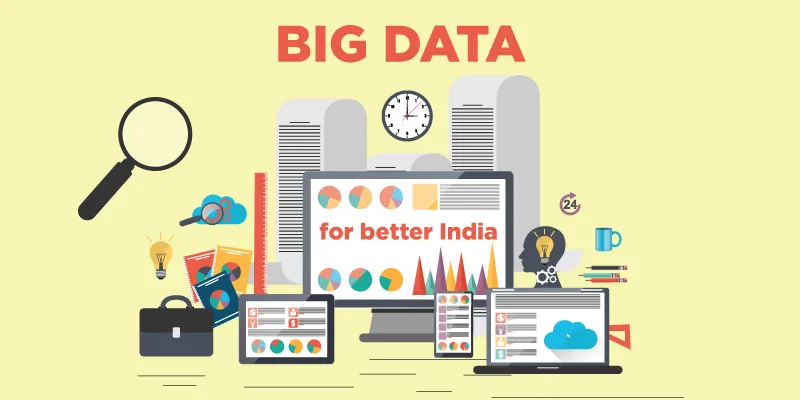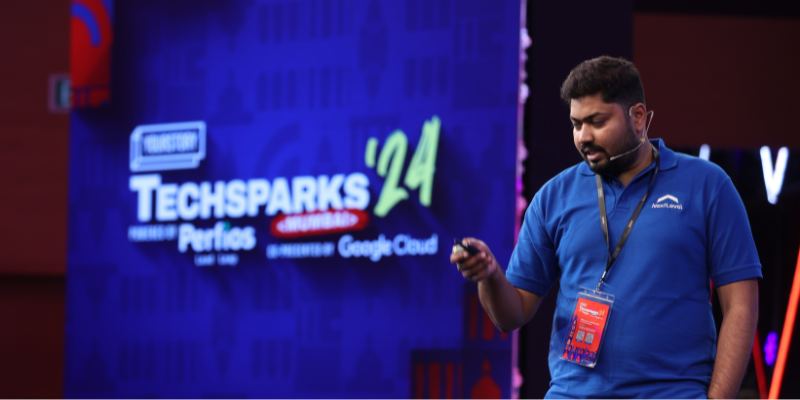Can startups give IT majors, business managers the boost they need to adopt big data?
The average business manager is yet to understand the real potential of big data, which is putting a crimp in India’s data revolution. On the brighter side, there are several bold experiments underway in big data, both at IT companies and at startups. The way forward is for the IT industry to partner with startups already working on new-age technologies and creating disruption.
Jonathan Aibe, a real estate broker, has bought a new Mercedes GLC-300, a SUV that understands the road that he is driving on. “mbrace” connect, the mobility platform of Mercedes, allows the car to connect to several apps over the cloud. From remote diagnostics and an in-vehicle Wi-Fi hotspot to entertainment on TuneIn Radio and figuring out a good restaurant in the neighbourhood, the car offers these and more. The app offers safety too—automatic collision and alarm notifications, SOS and emergency call capabilities, all processed over the cloud. “The connectivity package that I buy from Mercedes allows me to be connected to my surroundings at all times,” says Aibe.
What Aibe does not know is that the car is a device, and its mobility platform is crunching data that the car generates on a real-time basis. While the car collects structured data, the apps on board are also collecting data from social feeds like Twitter and LinkedIn. With this data, apps can offer drivers a better service. For example, based on usage patterns, it will know that the driver’s preferred language is Italian. But that’s not really what the data collection is all about. Imagine such patterns being collected and processed from millions of vehicles, and then analysed to provide insights that can help businesses make better decisions and plan strategies.

Big data analytics is the process of taking huge quantities of structured and unstructured data and using distributed computing platforms to combine and convert this into meaningful results. Analytics companies take these results to figure out consumer behaviour and offer predictive and prescriptive results for the 8.4 billion connected devices that Gartner predicts will exist on the planet in 2017.
Unfortunately, this digital transformation is yet to reach critical mass. IT services companies are still in the process of reinventing themselves to play for high stakes in the data monetisation game. They have to sacrifice their legacy margins for higher-value services like analytics and data structuring.
Although margins on the legacy IT side are eroding, they still constitute 90 percent of the business of companies like TCS, Infosys, Wipro, Cognizant and others. They have all been trying to reinvent themselves over the last three years. (If you already know that story, skip to the section ‘Enterprises that are leading the way’.)
A question of margins
Although IT majors’ net margins still hover between 17 and 25 percent, they have been caught between maintaining legacy solutions on the premises of the corporate rather than on cloud, and moving towards digital transformation. Many are taking some drastic steps to prepare for that change quickly for fear of losing clients to startups waiting in the wings to disrupt data storage, data replication and dynamic analytics.
Just last week, Infosys said it had handed out pink slips to 11,000 employees because of automation on the client side of the business, which no longer required people to manage and develop applications. The silver lining there is that the power of data can be harnessed; it is what people need to be re-skilled in.
“India has a multitude of large-scale problems that can apply the power of big data to find plausible solutions and implement them. We are seeing big data investments in agriculture, transportation, healthcare, banking, retail and energy,” says Praveen Bhadada, partner and head of digital transformation at management consulting firm Zinnov.
India has just started making investments in big data and has to overcome several challenges before this gains momentum. For one, large companies are hamstrung by their ability to create a clear data strategy, define governance models, predict data-led returns on investment (RoI), not to mention selecting the right tools, technologies and partners. Finding skilled talent and ensuring data privacy isn’t easy either.
“Today, the digital business forms anywhere between 5 and 15 percent of the total business for technology platforms and services companies,” says Praveen. He adds that data analysis and insights are a core part of many new engagements. Enterprises initially invest in pilots to establish the value and identify the RoI, and usually scale their investments only after that.
Most of these cloud-based platforms do not need engineers to code and develop as they are readily deployable. The large-scale lay-off at Infosys is likely to be the first of many waves as roles become redundant because of automation. However, companies that are showing the way in utilising big data are those who set clear outcomes by using that data.
Enterprises that are leading the way
General Electric, for example, has already been using data from all its machines since 2010 to understand their rates of failure so as to predict them before they occur. It has invested in machine learning algorithms to figure out the rate of failure on its jet engines, on wind turbines and healthcare equipment.
“We are using the digital twin model to understand the relationship between virtual and physical aspects that affect a machine. We did this with our wind turbines in South India,” says Vinay Jammu, Technology Leader, Physical-Digital Analytics at GE Global Research. GE combines wind turbine data with weather data and the data generated in order to capture wind movements to predict the impact on a machine. Jammu adds that statistical models must be able to predict the rate of failure and suggest prescriptive services dynamically. “Today, CIOs need to think about outcomes before getting into signing off on big data services, which are yet to take off on a large scale,” he emphasises.
Most Indian CTOs are looking at IT services companies to lead the way, which means this is a transformation that would be lucrative for IT companies to initiate.
The big data business of IT services companies
At the mid-sized IT services firm Mindtree Ltd, Manoj Karanth, Associate VP of the digital business, is hard at work to understand their clients in the consumer industry and their big data journey.
“We have seen our customers start their journey with data lakes, which are storage repositories that hold raw data. They transform it into required data models at the time of consumption,” he explains, adding that their customers have ingested different data sources in their enterprises, including external sources of data. Here are some examples of the data lake approach.
- Personalised experiences: Companies in retail, consumer packaged goods (CPG), travel and hospitality and education use the data lake approach to better understand their end customers through a “Customer 360” initiative by capturing a whole range of interactions with their end customers across channels.
- Product positioning: Customers in retail and CPG use these data lakes to merge third-party data and their sales information to better predict the right mix and quantity of products to be sold at their outlets.
It is not Mindtree alone that is looking at big data. Neither are companies seeing big data analytics as just a data solution; they are looking at the engineering too.
Debasish Chatterjee of the global data office at ITC Infotech is also hard at work to spearhead his organisation into a data revolution. His team is building an AI-based recommendation engine for a global retailer to improve business outcomes by figuring out the best way to optimise store assortment, trade spends, margins and credit planning.
“Adoption has leapfrogged in the last few years and big data and analytics are no longer seen as just as a technological evolution but as a business enabler with much (more) focused business outcomes,” says Debasish, whose division is being approached by clients looking to focus on business use cases like predictive asset maintenance, fraud or anomaly detection, recommendations or recommender systems and ATM service optimisation.
There is, quite literally, an explosion of data around the world, and every organisation needs to prepare to be able to use this data. IDC estimated in 2014 that the amount of useful data worldwide will increase 20x between 2010 and 2020, while 77 percent of the data relevant to enterprises would be unstructured through 2015.
One company that has transformed itself from being just a data storage provider into an information solutions provider is the multinational firm, Hitachi Data Systems (HDS). It is betting big on IoT analytics and smart city solutions. HDS’s customers, such as BEONTRA, Caterpillar Marine Asset Intelligence, Hitachi Rail Europe and Hyosung Corporation, use IoT and the data generated from devices to understand business value. HDS blends sensor data, machine-generated data and corporate operational and application data to help its clients uncover new growth opportunities.
Sanjay Agrawal, Director of Platforms and Solutions Group, Hitachi Data Systems, says there are some critical challenges to scaling IoT analytics in India. “Many solutions from other countries cannot be implemented in India as-is. They need to be customized as per the Indian market and environment,” he explains, adding that any solution provider must be able to understand the unique challenges that the country presents and the unique solutions needed to overcome them.
No wonder then that startups are making a big difference in this space and are, in fact, helping IT companies by automating data capture at the consumer’s end. Herein lies the conundrum: IT services companies have to implement the back-end platforms (Hadoop platforms like MapR) to capture volumes and varieties of data. But the velocity at which that data should be analysed ideally needs to be done by startups, who clearly have the edge over IT services companies because they are selling a business objective that is tied to outcomes; their algorithms achieve the desired outcomes, going beyond just implementing an IT solution.
In simple terms, a corporate customer would say that if the IT application helps it to achieve higher margins or revenues, then it will pay the solution provider. IT services firms, however, only create the plumbing for the organisation, and have never had to tie their business to their client’s business outcomes. We are therefore in an era that encourages—almost mandates—collaboration that enables co-creation. The question, though, is whether IT services companies will budge from their current stance.

Why startups matter for IT services in the data game
One disruptor in this space has been cloud data management startup Rubrik, which has raised $292 million from Vinod Khosla and Mark Leslie, among others. The amount is significant by any standards, but more so for a three-year-old company, all because its data backup platform has disrupted the storage industry.
The Rubrik cloud appliance can pull data from a multitude of applications across the globe for an organisation and copy data in different cloud environments in an instant. For an organisation, the fact that data is available in real time speeds up decision-making. Further, should a data centre fail, copies of this data are available on different clouds. “We can implement our technology with IT partners and enable them to deliver better results to clients,” says Bipul Sinha, Co-founder of Rubrik. He adds that the world is all about securing data and how you can pull it out faster.
Similarly, there are companies like Bezirk, sitting out of Bengaluru, who are using software to understand location of consumers in a store and manage advertorial data that is tailor-made for the consumer immediately. Bezirk has piloted with 50 stores in the US and is now preparing for a roll-out in 5,000 stores nationwide. Simply put, retailers get to increase their margins by knowing from Bezirk the spending habits of their customers and which of its aisles chalks up the most footfalls.
These innovations aren’t limited to core storage, retail and automotive. Even agriculture has big data functionality. In the Nilgiris, Vivek Rajkumar has collected terabytes of data from 300 acres of farms, from which he is creating a massive data set. This structured data will require massive processing capabilities. This is exactly the kind of thing for which Vivek’s startup, Aibono, is building an AI engine – to crunch data across multiple formats.
Perhaps this is the innovation that was missed by IT services companies because not many believed in building a product story around the services business. Today, only Finacle from Infosys is a large business line worth half a billion dollars. Today, the IT services industry has to partner with companies developing such new-age technologies because disruption is happening outside the large corporations. And so far, the best way to monetise data is to engage with startups.
Startups use data, it is their lifeline
Take the example of i2e1, which collects data from over 20 million devices every month. “We analyse over 50 million data points daily to estimate footfalls at various physical market places across the country, which helps our clients to efficiently manage their current stores as well as plan new stores,” says Satyam Darmora, founder of i2e1. He says that the company gets retailers to use data in forms that are usable.
There are data stories all around us though data usage remains nascent in India. UIDAI (the world’s largest biometric database) is a great example of how big data infrastructure has been used to deliver a product that powers the digital identity of every Indian. The challenges around big data projects are not really unique to India but more related to poor planning and weak linkage to real business problems. “In our view, more than the CTO, it is the business managers who often lack the understanding of the real potential of big data, which is curtailing progress,” says Satyam. He adds that the real users of benefits will be P&L owners and not necessarily the technology teams.
While larger companies are still struggling to find the real value from big data applications because they fear investing in the new, some like Capital Float are setting the example by using insights derived from big data to make smarter decisions and drive optimisation. “We now collect a lot more data than we did initially and bring it all to bear upon our decisions,” says Rohan Angrish, CTO of Capital Float. He adds that behavioural data on "how" a customer applies for a loan enables them to quickly identify which customers qualify for fast-track approvals (while weeding out those with low potential) so that Capital Float can fine-tune their experience.
The company has gone live with multiple credit models that have arisen from analysis of large data sets. There are products at Capital Float that are entirely machine-driven, and management has the confidence of running these models without any human intervention. These models also have a great track record, and the company is looking to push the boundaries on how much of the decision making they can leave to big-data-led, machine-only decisions.
“Big data analytics is still a few years away from being front-and-centre in terms of being the default modus operandi,” admits Angrish.
If the CTO of a startup that is already using big data feels it is early days yet, then large legacy IT services organisations would naturally be slower to figure out business models in the era of the cloud. That said, they can partner with the startup ecosystem, which is already deep into big data to make data platform engineering and data crunching on a real-time basis a reality. The ball is now firmly in the court of the big IT companies. The message is clear: there’s no need to re-invent the wheel.











![[Funding alert] Contactless retail tech startup Gobbly raises $500K from Sauce.vc](https://images.yourstory.com/cs/2/b87effd06a6611e9ad333f8a4777438f/Imagefskc-1594011063679.jpg)